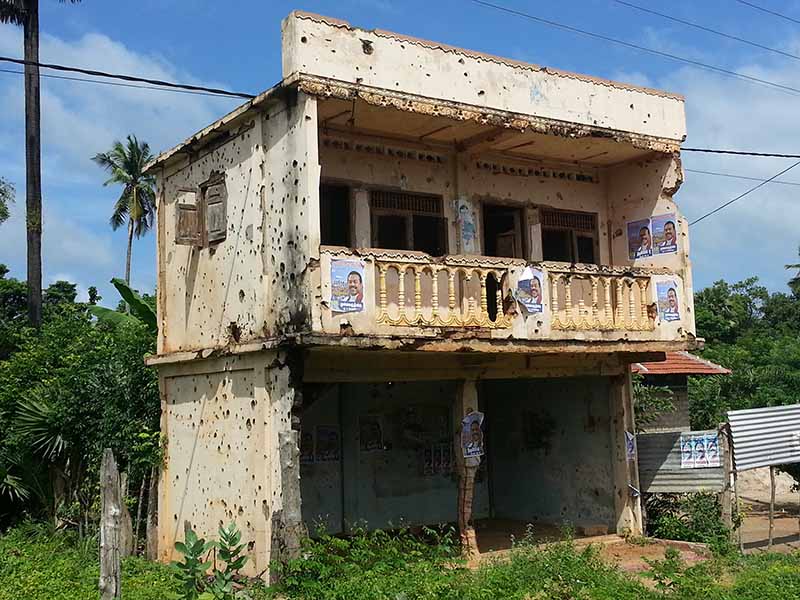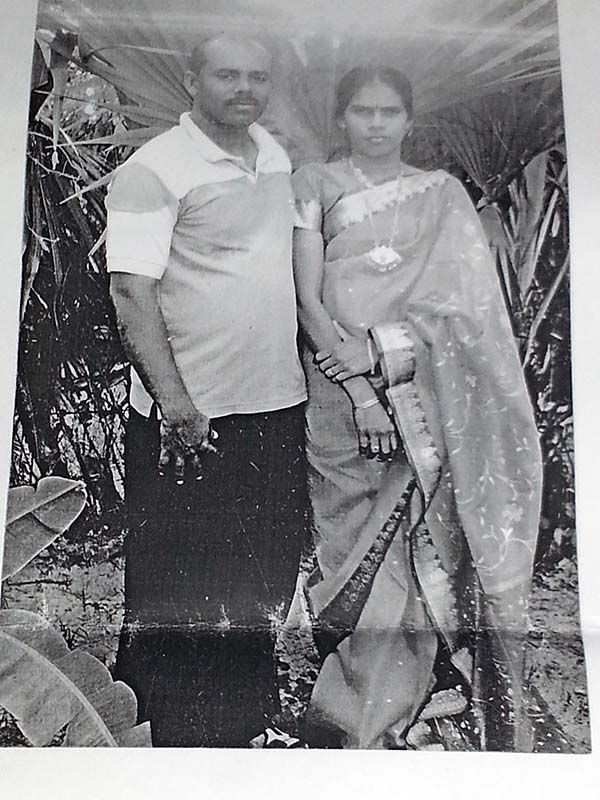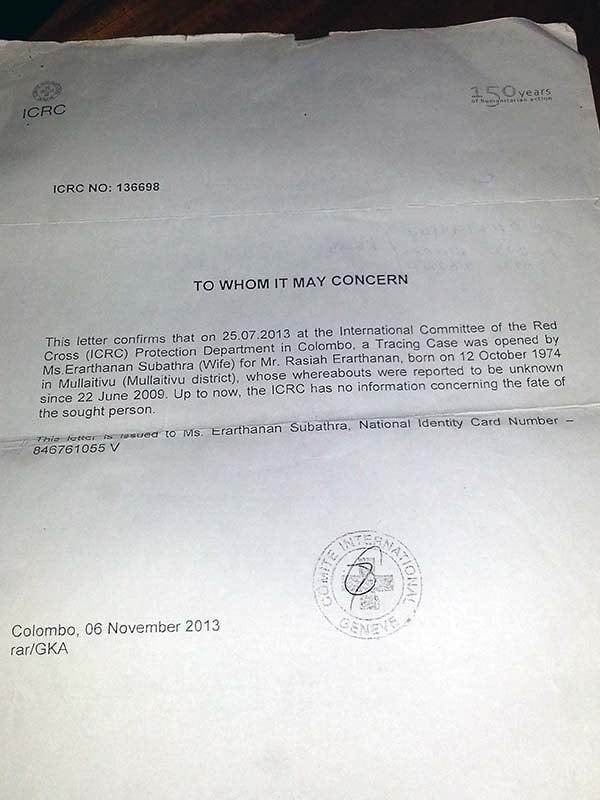Sri Lanka – The Long March for Justice
As Sri Lanka celebrated its 75th Independence Day, Tamil students, families of the forcibly disappeared, religious leaders, and civilians from a broad spectrum of the North-East Tamil society led a protest march on February 4-8, 2023 from Jaffna in the Northern Province to Batticaloa in the Eastern Province. Thousands rallied with two key demands — an internationally conducted and monitored referendum for Tamils and the end of military occupation of the North and East of Sri Lanka.
This mobilization — the latest in the long struggle for justice for Tamils — comes at the heels of a landmark move by the Canadian government. On January 10, 2023, Canada imposed targeted sanctions against Sri Lanka’s two former Presidents, the brothers Mahinda Rajapaksa and Gotabaya Rajapaksa, to “end international impunity against violators of international law.” Two senior military officers, Staff Sergeant Sunil Ratnayake and Lieutenant Commander Chandana Prasad Hettiarachchi, also face sanctions. All are accused of “gross and systematic violations of human rights,” carried out during the civil war between the Sri Lankan government and the separatist Liberation Tigers of Tamil Eelam (LTTE), which occurred from 1983 to 2009.
“Despite continued calls from Canada and the international community to address accountability, the Government of Sri Lanka has taken limited meaningful and concrete action to uphold its human rights obligations. This jeopardizes progress on justice for affected populations, and prospects for peace and reconciliation.”
News Release, Global Affairs Canada

It was under Mahinda Rajapaksa as the President and Gotabaya Rajapaksa as the Secretary of Defense, that the most horrific war crimes were committed against the Tamils towards the bloody end of the armed conflict in 2009. The brothers oversaw the carnage through indiscriminate bombing and murdering of tens of thousands of Tamil civilians, in what many observers called a genocide. According to the United Nations towards the end of the war, around 40,000 civilians were killed after being herded into so-called no-fire zones, and then mercilessly bombed by the armed forces. Many captured combatants and civilians were forcibly disappeared and remain missing. The Rt. Rev. Dr. Rayappu Joseph, the Roman Catholic Bishop of Mannar and fellow clergy have given evidence that a staggering 146,679 people disappeared and remain missing, based on the Sri Lankan government’s own Census data.
Despite these atrocities, basking in the support of the Sinhala-Buddhist majority, the Rajapaksas remained in power till 2015. Gotabaya Rajakpaksa then assumed presidency in 2019 and Mahinda was sworn in as the prime minister for the fourth time in 2020. Instead of pursuing accountability, justice, and reconciliation in the aftermath of the conflict, the Rajapaksa regime hampered international investigations into the war crimes and promoted extremist Sinhalese Buddhist nationalism. They ruled with impunity and blood on their hands. Staff Sergeant Sunil Ratnayake, sentenced to death in 2015 for his role in a massacre of eight Tamil civilians including a five-year old in 2000, was pardoned by Gotabaya Rajapaksa in 2020. This ethno-nationalist support, however, melted in 2022 as the country’s economic collapse boiled over. On July 9, 2022, tens of thousands of citizens stormed the President’s palace. Gotabaya Rajapaksa, fled the country and resigned days later — and now lives under special security and a state bungalow following his return.
Sri Lanka has the second-highest number of enforced disappearances in the world. Since 2009, families of the disappeared have gathered outside the local administrative offices in Mullaitivu — the final theater of war — where tens of thousands lost their lives and close to 150,000 people, mostly Tamils, were abducted by the Sri Lankan armed forces and never seen again. Family members are demanding the return of their loved ones or answers as to their whereabouts. Braving heavy militarization and surveillance, crowds of Tamil mothers, sisters, fathers, and brothers gather each year to light flames in remembrance of their loved ones on Mullivaikkal beach, in a rite of communal mourning known as “Remembrance Day.” During this long wait — over 2180 days of continuous vigil and fast by the “families of the forcibly disappeared,” over 140 of their members have passed on without knowing the fate of their loved ones.
Tamils in Sri Lanka: Still Waiting for Justice and Accountability


More than 13 years since the end of the war, marginalized and persecuted since the country’s independence 75 years ago, Tamils in Sri Lanka still await justice and accountability. Sanctions by Canada are the latest in an international effort towards the realization of justice. Between 2020 and 2022, the United States issued sanctions for human rights violations against several Sri Lankan military officials, including Army Chief Lt. Gen. Shavendra Silva, Naval Officer Chandana Hettiarachchi, Staff Sergeant Sunil Ratnayake, and the former head of a clandestine Sri Lankan Army platoon, Prabath Bulathwatte. Recognizing "the demonstrated inability and unwillingness of the government to advance accountability at the national level,” in January 2021, the UN High Commissioner for Human Rights Michelle Bachelet called for “international action to ensure justice for international crimes.” In October 2022, in the face of fierce opposition from Sri Lanka, the UN Human Rights Council renewed a mandate to collect evidence of atrocities committed during the decades-long civil war.
Government-led efforts to systematically erase Tamil culture and bifurcate the contiguous Tamil homeland by separating the North and East have continued relentlessly even after the end of the war.
Meanwhile the war against the Tamil population still rages on under a different guise. As extensively documented by the Oakland Institute, thousands remain displaced from their lands and homes with the colonization and Sinhalisation of Tamil lands still pursued. Government-led efforts to systematically erase Tamil culture and bifurcate the contiguous Tamil homeland by separating the North and East have continued relentlessly even after the end of the war. Since 2019, the state machinery under Rajapaksas was in full swing to convert historic lands, monuments, and places of worship of the Tamil people to Buddhist temples, Buddhist culture, and practice — at a greater pace than it was in 2015. Government institutions including the Forest Department, the Archaeological Department, the Mahaweli Authority, have been used, under the aegis of the military occupation, for land appropriation with Tamil lands declared as archaeological reservations, wildlife sanctuaries, forest reserves, and special economic zones. And worse, the Sri Lankan military continues to occupy vast swathes of land across the North-East. The military occupation of the traditional Tamil land is extreme — with a ratio of one soldier for every six civilians in the Northern Province in general, and in particular, one soldier to every two civilians in Mullaitivu and the devastated Mullivaikkaal region.
The determined struggle of the Tamils for justice and accountability, both inside and outside the country, has kept international pressure on Sri Lanka. Steps taken by the US and Canada to strip the perpetrators of human rights abuses of their impunity, are very important and it is imperative for other countries to follow suit. But this should not mark the end of the international community’s responsibility given the country’s hope for peace and reconciliation has already been delayed far too long. In 2009, the United Nations failed to prevent the systematic massacres, war crimes, rapes and executions that marked the end of the civil war. What is now needed is an international independent judicial process that puts the perpetrators of human rights abuses and atrocity crimes on trial. Swift international action is also needed to pressure the Sri Lankan government to take steps towards demilitarization and the return of stolen land in the North and East of the country. This is the only way to ensure that a genuine process of truth recovery, justice, and reparations is initiated to achieve genuine reconciliation that serves the needs of all victims and all the communities of Sri Lanka.

